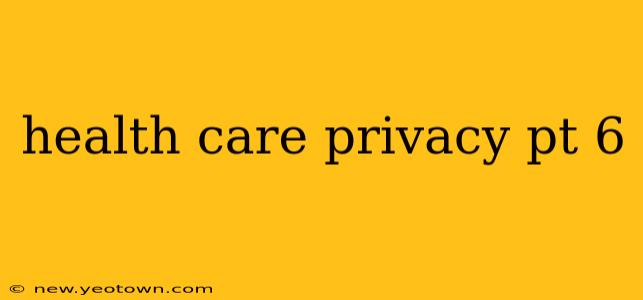Healthcare Privacy: Navigating the Complexities (Part 6) – Beyond HIPAA
This isn't just another dry legal lecture; it's a story about you, your health information, and the ever-evolving landscape of privacy in healthcare. We've covered the basics of HIPAA in previous installments, but this time, we're delving into the nuances, the gray areas, and the future of protecting your most sensitive data. Think of it as a detective story, where we unravel the mysteries surrounding your medical records.
Imagine this: You're at the doctor's office, discussing a sensitive condition. You trust your doctor implicitly, but what happens to that information after you leave? Does it stay safely tucked away, or does it travel further than you might imagine? That's the crux of healthcare privacy – it's not just about the doctor's office; it's a vast network of interactions and data points.
What Happens to My Medical Records After I Leave the Doctor’s Office?
This is a question many patients grapple with. Once you leave the doctor’s office, your information is typically stored electronically in the doctor’s system. This system has security protocols designed to protect your data, adhering to HIPAA guidelines and often going beyond them. However, access controls are also in place for authorized individuals, including billing staff, insurance companies, and other healthcare providers if you provide consent or it’s required for treatment coordination. The sharing is always governed by legal and regulatory requirements.
How Do Insurance Companies Use My Health Information?
Insurance companies need your health information to assess risk, determine coverage, and process claims. They are bound by HIPAA and state laws, meaning they can't just share your information with anyone. However, they may use your information for purposes like statistical analysis to improve their services or for internal audits. This usually involves de-identified data to protect your privacy, where all personally identifiable information is removed.
What About Genetic Information? Is That Protected Differently?
Genetic information is indeed unique and holds a particular level of sensitivity. The Genetic Information Nondiscrimination Act (GINA) offers additional protection, preventing discrimination based on genetic information in health insurance and employment. While HIPAA generally covers this information as well, GINA offers a crucial extra layer of safeguard, specifically against genetic discrimination.
Can My Employer Access My Medical Records?
Generally, no. Your employer has very limited access to your medical records, primarily because it's not considered relevant to your job performance unless you've explicitly released that information or it's necessary for workplace accommodations (like disability-related requests). Attempts to access your medical records without your consent are illegal and subject to penalties.
What Are My Rights Regarding My Health Information?
You have significant rights when it comes to your health information: the right to access your records, the right to request corrections, the right to restrict the disclosure of certain information, and the right to file a complaint if you believe your privacy has been violated. These rights are enshrined in HIPAA and state laws, giving you considerable control over your personal medical data.
What About Data Breaches? What Happens Then?
Data breaches are a serious concern in healthcare. If a breach occurs, HIPAA requires covered entities (like hospitals and doctors' offices) to notify you and take steps to mitigate the harm. The notification will explain the nature of the breach and what steps are being taken to protect your information.
This journey into healthcare privacy is ongoing. As technology advances and data becomes increasingly valuable, we'll continue to face new challenges in protecting our sensitive information. However, awareness and understanding of your rights and the laws governing your healthcare information are your most powerful tools in safeguarding your privacy. Stay informed, ask questions, and remember that your health information is your right to control.

